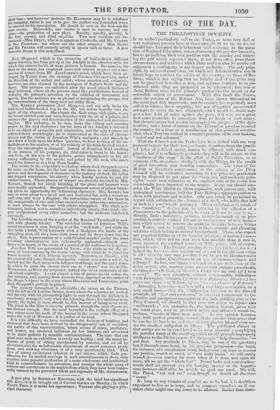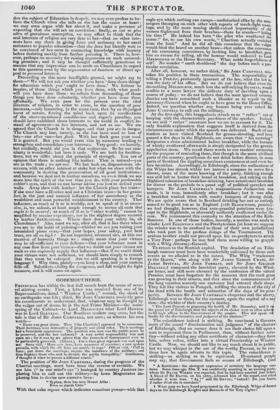TOPICS OF THE DAY.
TIIE PHILLPOTHAN DOCILITY.
Jr we wished particularly well to the Tories, as some. very dull or very malignant. persons have at times thought fit to say we do, we
should have lamented their behaviour with reference to the ques-
tion of National Education, not as obstructing the popular interests, but as prejudicing their own position with the country and widen-
ing the gulf which separates them, if not from office, from those
circumstances and relations which alone could render its continued enjoyment a contingency in any degree probable. The only prin-
ciple, by universal confession, on Which any Administration can in future hope to conduct the ailltirs of the country, are those of Re- form.,. which is not saying that an infinite deal of deception may not be practised hereafter as DOW, and reforms continue to be ob-
structed while they arc pretended to be -advanced; but, real or sham, Reform must be the principle professed—the actual or the ostensible object of government. With this truth the Tories, since the passing of' the Refonn Act, have shown themselves tbr the most part duly impressed; and the country has repeatedly been called to witness, these ungainly, but not altogether unsuccessful attempts to enact the new character, which would no doubt sug- gest a fine field of satire against the party, if it were not a great deal more profitable to encourage than to laugh at such actors.
But circumstances last session interrupted the progress of the deli- neation ; and a burst of nature on the Education question recalled the country for a tune to a recollection a that political antedilu- vian? when Toryism walked in a rogue's paradise °fits own making, "naked and not ashamed."
That the Church and the Tories have been visited with any very pungent regrets for their too passionate departure from the practi- cal rules of political acting, cannot be affirmed with much em- phasis; but it i8 sufficiently probable they will SO far return to the business of the stage " in the aft:1dr of Public Education, as to compete (Oh, unarduous rivalry !) with the Whigs for the credit of' good intentions and seeming concessions. Tfic value of the Bishop of EXETER'S countenance to the scheme of the Privy Council will be estimated according to the price any gentleman may be disposed to put upon its "very just and moderate prin- ciples "—our own valuation at the smallest coin of the realm hag occasionally been imparted to the reader. If any one should con- sider the Whig 7dinistcr's views expmisive, such person may, with- undoubted, consistency. hail the Tory Bishop's appropinquation to them with gratitude and wonder. (Ile may surely be permitted to regard with satisthction the :1:1,ValICCS of a snail, who holds that half an inch is a considerable journey.) What :_zitistliction to minds of less "moderate" desires may ii•,; all:Jr:led by the adhesion of a PtuLtrorrs to the principle of a. ltcsset.c, it is not so ea:3y to say : directly, little ; indirectly, perhaps, more—inasmuch as no pro- ceeding is entirely without advante;te to Cie cause of real legisla- tion which serves to remove the artificial hostility between Whigs and Tories, and to exhibit the7u in those amiable and charming relations which belong to natural brotherhood. Those who expect any practical fulfilment of the broader principles of national educa- tion, which, when reform was even less possible than it now is, were amongst the cardinal points of 1,Vh3g policy, will, of course, expect in vain. The ILLPUTTS dray-horso has (at least, lais he ?) helped the RussELL slow waegon out of a rut in the old road—that is all ; svherehy one may possibly hone to get to Haminersmith some time betbre Christmas—in an ego of steam-carriages and railways ! In fact, our hopes tire truch on a liar with those of the dying sceptic, who, marrims pious prvyer with impious parenthesis, exclanned—" Goa, tiwre is a (;(4.) save my soul, WI have a soul)." We netv ejaculata, without unreasonable infidelity- " Oh Reforming, finister, (if there is a 1?,:filradag Ninister,) im- prove our chances of Hamm (if ice leers a uy elaruees Byarat)."
Assuminl.„P 1n) ,,,,,,,,,, —end it is stilla very large assumption on a very small basis,—thut the Philip-M :inn adiesion to the inssell principle, "just and moderate, is an event tantamount to the effective and unopposed execution of the little piddling plan oi.the Privy Council, we should in that case not refuse to rejoice also "moderately ; " for, undoubtedly, the hardest biscuit, given with the worst grace may be pret'erred bcflwe starvation—it would be, perhaps, "harder it' there were none." In our opinion Lazarus may, with perfect propriety. devour all the crumbs whatsoever that he can lay his hands on, and thst without placing himself even un- der the smallest obligation to Dives. The privileged classes hi that matter are to be considered as in some measure exemplifying the peculiar mood of the auxiliary which an old proverb improperly attributes to the Divine power : lyt the people " help themselves "— and then. Any gratitude to Dives, may be out of the question; but if through some hand, by his gracious permission—the hand, for instance, of a comphtisant Whig lackey—we can hope to receive any portion, crumb or crust, of "our daily bread," we will surely munch it—even coming for more when it is done, and again for more, till we get the "whole loaf." Proud looks and contumelious words shall not prevent us ; the haughty master or the imperti- nent footman shall alike be unable to spoil our meal. We will, like Pistol, "eat and eat," even though we should all the time " swear."
So long as any crumbs of comfort are to be had, it is doubtless expedient to live on in hope, and to comport ourselves as if our entire claim might one day come to be allowed. Rather than aban- don the subject of Education in despair, we may even profess to be- lieve the Church when she tells us she has the cause at heart : we may even argue with her about it, and make a pretence of expecting that she will act on conviction : finally, as our ne plus ultra of gratuitous assumption, we may affect to think that the .v interests nterests of religion are very dear to her—that no other lute- vests have any share in giving force and acrimony to her usual resistance to popular education—abet she does but blandly wait to be convinced of her error in connecting knowledge with impiety before desisting meekly from further pursuing it. There is, how- ever, perhaps no necessity for raising arguments on such astound- ing premises ; and it may be thought sufficiently gratuitous to assume that any impression can be made on Churchmen in regard to this question even by the argumention ad hominem or direct ap- peal to personal interest. Proceeding on this more intelligible ground, we might say to them—" We will not ask you whether you have done those things' for education which you ought to have done.' We forbear to inquire, of those things which you have done, with what good- will you have done them : we refrain from demanding, of those things you have done voluntarily, whether you have done them effectually. We even pass for the present over the vital 'interests of religion, in order to come, to the question of your interests,—only lamenting, in the mean time, that by an ill-judged burst of nature, forcing the mind back upon its recollections of the above-mentioned antediluvium and rogue's paradise, you should have exhibited those interests to the world in conflict, in- stead of agreement—as two interests, and not as one. We are agreed that the Church is in danger, and that you arc in danger. The Church may lose, namely, as she has been used to lose of late—one after one—her flock. With her flock goes your wool. It is granted. But you would avert this by measures tending to strengthen and consolidate your interests. Very good ; we humbly, but cordially, would aid you in that endeavour. So far our una- nimity is wonderful; but here it ends. We are both for fortifica- tions, but we differ about the principle of strength. You are of opinion that there is nothing like leather. That is natural—you emit) the trade; we are not. We but look on, dispassionate ob- servers,.with no other interest at stake but what we share with the oonsmuuity in desiring the preservation of all good institutions ; and, because we deal not in leather ourselves, we even think we see more into the spirit of the war than you do, with your pardonable cobler's eyes, and that we can better advise you how to defend your walls. Away then with leather : let the Church place her trust— if she must have a Heathen and not a Christian trust—in her genius loci, in the just and natural influence of her ascendancy as the wealthiest and most powerful establishment in the country. That influence, as much of it as is worldly, not to speak of it as exces- sive, is, we submit, at least ample enough to secure all ends that ought to be secured; as much of it as is "other worldly" cannot be
amplified by secular expedients, nor in the slightest degree secured by leather fortifications. Where then does your safety he, oh Churchmen ? Alas, most we say, after all, that it lies there where you are in the habit of pointing—whither we see you raising your
astonished pious eyes,—that your hopes, your safety, your best trust, are all on high ? Be not impatient, reverend sirs, at this our
mention of heavenly things we : simply mean that your virtues may be all-sufficient to your defence—that your influence must in m
any case flow fro your virtues—that we doubt not your virtues are such as can copiously supply that influence—that if we could think your virtues were not sufficient, we should have simply to remark that they must be enlarged. Are we still speaking in a foreign language ? Why then, plainly—you keep a shop, and your custom falls off. Substitute civility for arrogance, and full weight for light measure, and it will come on again.



























 Previous page
Previous page